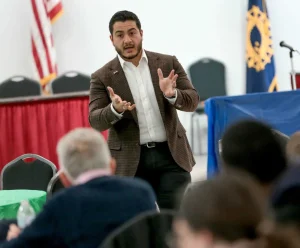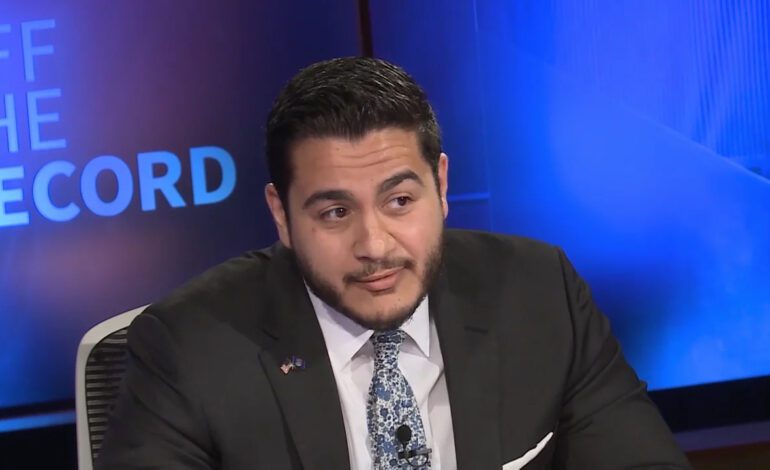ANN ARBOR – Dr. Abdul El-Sayed, director of the Wayne County public health department, has officially resigned from his position in preparation for a potential run for the U.S. Senate in 2026. Democratic Senator Gary Peters has announced he will not seek re-election, creating an open field for his seat.
In comments to the Detroit Free Press on April 1, El-Sayed — who previously ran as a Democrat for Michigan governor in 2018 — expressed deep gratitude for the opportunity to work under county executive Warren Evans and highlighted accomplishments during his tenure. These included:
- A medical debt relief program for residents
- The installation of air quality monitoring sensors throughout the county
- Providing low-income children free glasses
- Placing life-saving overdose reversal medication in 100 locations across Wayne County
El-Sayed was appointed to lead the health department in March 2023, making him the top health official in Michigan’s most populous county.
He explained that his official departure from the role would be on April 3.
“I’m stepping down to explore the possibility of running for the U.S. Senate,” he said, but emphasized that he has not made a final decision.
“I hope to reach a decision within the next two weeks.
Early race dynamics and potential contenders
So far, only one official Democratic contender has entered the race for the open Senate seat: State Senator Mallory McMorrow, who represents the Eighth Senate District, which includes parts of Clawson, Detroit, Royal Oak, Beverly Hills and all of Berkley, Birmingham, Ferndale, Huntington Woods, Oak Park, Pleasant Ridge and Royal Oak Township.
However, other prominent Democrats potentially eyeing a run include Michigan Attorney General Dana Nessel and U.S. Rep. Haley Stevens, who represents part of southeastern Michigan.
On the Republican side, several names are circulating, including Former U.S. Rep. Mike Rogers, who lost the 2024 Senate race to Democrat Elissa Slotkin, and U.S. Reps. John James, Bill Huizenga and Lisa McClain.
The primary elections for both parties will take place in August 2026, followed by the general election in November.

El-Sayed’s political outlook and criticisms of Trump
El-Sayed expressed concern over federal program cuts under President Trump, particularly in the area of public health.
“It’s heartbreaking to witness these cuts,” he said, “…but if we’re willing to stand up for the America we need and deserve, we can reverse this damage and build a federal government that delivers and builds.”
“It’s heartbreaking to witness these cuts… but if we’re willing to stand up for the America we need and deserve, we can reverse this damage and build a federal government that delivers and builds.” — Dr. Abdul El-Sayed.
“Tariffs have gutted too much of Michigan’s manufacturing base, hollowing out towns and communities,” he told The Arab American News. “And while tariffs can be a useful tool, they’re like chemotherapy for cancer. If you use a little it can help. If you give them all at the same time, you kill the patient. Trump is killing the American economy.”
In a January interview with the Detroit News, El-Sayed signaled his intent to run, stating he hoped to “build a unified movement that brings people together around real solutions to fix the political dysfunction we’re living through”, referencing Trump’s return to the presidency.
“The most important thing is that we need someone who’s committed to Michigan, who understands, empathizes and is ready to tackle the challenges people here are facing,” El-Sayed said when asked what motivates his potential Senate run.
He added that he is not afraid of competing against any other Democratic candidate.
“The most important thing is that we need someone who’s committed to Michigan, who understands, empathizes and is ready to tackle the challenges people here are facing.” — Dr. Abdul El-Sayed.
Background: from Detroit to national recognition
El-Sayed, 40, a resident of Ann Arbor, ran as a progressive Democratic candidate for governor in 2018, supported by Sen. Bernie Sanders (I- VT). He finished second in the primary, earning 342,000 votes (30 percent). Gov. Whitmer won 588,000 votes (52 percent), while Shri Thanedar, who would later go on to win a seat in Congress representing Detroit, got 200,000 votes (18 percent).
El-Sayed made history as the first Muslim candidate for Michigan governor, and his campaign was seen as a leading voice in the state’s growing progressive movement.
Personal profile
Born in Detroit in 1984 to Egyptian immigrant parents, El-Sayed graduated from Andover High School in Bloomfield Hills in 2003. He then attended the University of Michigan, studying biology and political science and graduating with honors. He was chosen to deliver the student commencement speech in 2007, sharing the stage with former President Clinton.
A talented athlete in lacrosse, El-Sayed earned a full scholarship to the University of Michigan medical school. He later received a prestigious Rhodes scholarship and completed a Ph.D. in public health from Oxford University in 2011. In 2014, he earned a medical degree from Columbia University’s College of Physicians and Surgeons, funded by the Soros fellowship for new Americans. However, he did not complete a medical residency and is therefore not licensed to practice medicine.
Before entering public office, El-Sayed worked as a professor of public health and epidemiology. He later served as Detroit’s public health director from 2015 to 2017, where he earned national attention for revitalizing the city’s long-dormant health department.
After stepping down to run for governor, he founded Southpaw, a political action committee aimed at electing progressive candidates in Michigan.






Leave a Reply